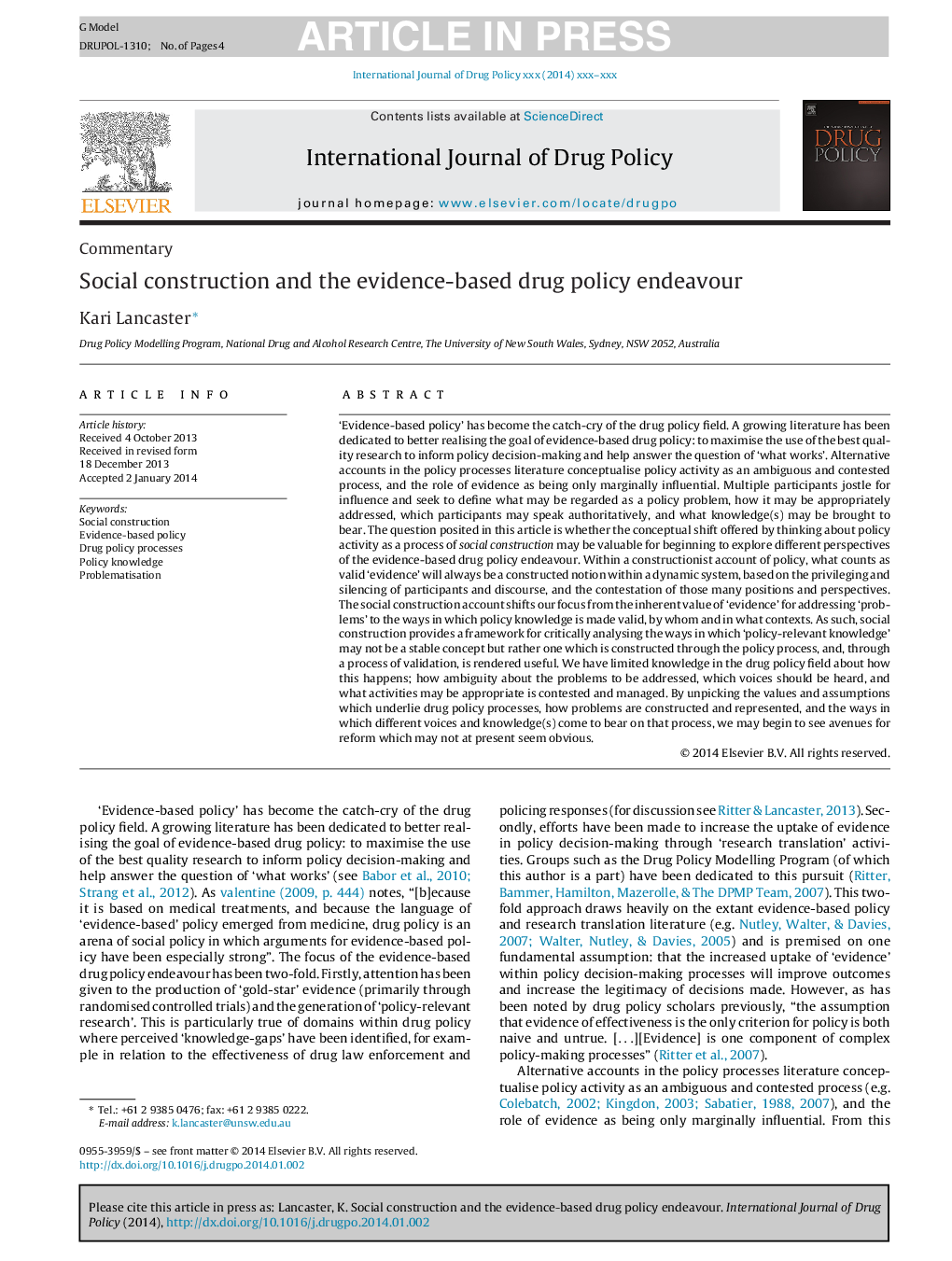| کد مقاله | کد نشریه | سال انتشار | مقاله انگلیسی | نسخه تمام متن |
|---|---|---|---|---|
| 7513767 | 1486293 | 2014 | 4 صفحه PDF | دانلود رایگان |
عنوان انگلیسی مقاله ISI
Social construction and the evidence-based drug policy endeavour
ترجمه فارسی عنوان
ساخت و ساز اجتماعی و تلاش مبتنی بر شواهد مبتنی بر مواد مخدر
دانلود مقاله + سفارش ترجمه
دانلود مقاله ISI انگلیسی
رایگان برای ایرانیان
کلمات کلیدی
ساخت اجتماعی، سیاست مبتنی بر شواهد، فرآیندهای سیاست مواد مخدر، دانش سیاسی، مشکالت
ترجمه چکیده
"سیاست مبتنی بر شواهد" تبدیل به گریه در زمینه سیاست مواد مخدر شده است. ادبیات در حال رشد برای اهداف خط مشی سیاست های دارویی مبتنی بر شواهد بیشتر شده است: برای به حداکثر رساندن استفاده از بهترین تحقیقات با کیفیت برای اطلاع دادن به تصمیم گیری های سیاسی و کمک به پاسخ به سوال «چه چیزی کار می کند». حساب های جایگزین در ادبیات فرایند سیاست ادغام فعالیت های سیاسی را به عنوان یک فرآیند مبهم و متضاد و نقش شواهد به عنوان تنها حاشیه ای تاثیرگذار. شرکت کنندگان چندگانه برای نفوذ و تلاش برای تعریف آنچه ممکن است به عنوان یک مسئله سیاسی مطرح شوند، چگونه ممکن است به طور مناسب مورد توجه قرار گیرد، شرکت کنندگان ممکن است به طور صریح صحبت کنند، و چه دانش (ها) ممکن است به ارمغان آورد. سوال مطرح شده در این مقاله این است که آیا تغییر مفهومی ارائه شده توسط تفکر در مورد فعالیت سیاسی به عنوان یک فرایند ساخت و ساز اجتماعی ممکن است برای شروع دیدگاه های مختلف تلاش های مبتنی بر شواهد مبتنی بر مواد مخدر مفید باشد. در یک حساب کاربری ساختاریگرانه سیاست، آنچه که به عنوان شواهد معتبر شناخته می شود، همیشه یک مفهوم ساخته شده در یک سیستم پویا است که بر پایه امتیاز دادن و خاموش کردن شرکت کنندگان و گفتمان و مخالفت آن موقعیت ها و دیدگاه های بسیاری است. حسابداری اجتماعی اجتماعی تمرکز خود را از ارزش ذاتی "شواهد" برای رسیدگی به "مشکلات" به شیوه هایی که دانش سیاسی آن را معتبر می داند، توسط چه کسی و در چه زمینه ای، تغییر می دهد. به همین ترتیب، ساختار اجتماعی چارچوبی برای تحلیل انتقادی از روشهایی که "دانش مرتبط با سیاست" ممکن است یک مفهوم پایدار نیست بلکه یک فرایند سیاسی است، و از طریق یک روند اعتبار سنجی مفید است. ما در زمینه سیاست مواد مخدر در مورد این که چگونه این اتفاق می افتد، دانش محدودی داریم. چگونگی ابهام در مورد مسائلی که باید مورد بررسی قرار گیرد، کدام صداها باید شنیده شود، و چه فعالیت هایی ممکن است مناسب باشد، مورد بحث و بررسی قرار گرفته است. با برداشتن ارزشها و مفروضاتی که فرآیندهای سیاست مواد مخدر را در بر میگیرد، چگونگی شکلگیری و ارائه مشکلات و روشهایی که صداهای مختلف و دانش (دانش) در آن فرآیند است، میبایست راههایی را برای اصلاحاتی که ممکن است نباشد حاضر به نظر می رسد واضح است.
موضوعات مرتبط
علوم پزشکی و سلامت
پزشکی و دندانپزشکی
روانپزشکی و بهداشت روانی
چکیده انگلیسی
'Evidence-based policy' has become the catch-cry of the drug policy field. A growing literature has been dedicated to better realising the goal of evidence-based drug policy: to maximise the use of the best quality research to inform policy decision-making and help answer the question of 'what works'. Alternative accounts in the policy processes literature conceptualise policy activity as an ambiguous and contested process, and the role of evidence as being only marginally influential. Multiple participants jostle for influence and seek to define what may be regarded as a policy problem, how it may be appropriately addressed, which participants may speak authoritatively, and what knowledge(s) may be brought to bear. The question posited in this article is whether the conceptual shift offered by thinking about policy activity as a process of social construction may be valuable for beginning to explore different perspectives of the evidence-based drug policy endeavour. Within a constructionist account of policy, what counts as valid 'evidence' will always be a constructed notion within a dynamic system, based on the privileging and silencing of participants and discourse, and the contestation of those many positions and perspectives. The social construction account shifts our focus from the inherent value of 'evidence' for addressing 'problems' to the ways in which policy knowledge is made valid, by whom and in what contexts. As such, social construction provides a framework for critically analysing the ways in which 'policy-relevant knowledge' may not be a stable concept but rather one which is constructed through the policy process, and, through a process of validation, is rendered useful. We have limited knowledge in the drug policy field about how this happens; how ambiguity about the problems to be addressed, which voices should be heard, and what activities may be appropriate is contested and managed. By unpicking the values and assumptions which underlie drug policy processes, how problems are constructed and represented, and the ways in which different voices and knowledge(s) come to bear on that process, we may begin to see avenues for reform which may not at present seem obvious.
ناشر
Database: Elsevier - ScienceDirect (ساینس دایرکت)
Journal: International Journal of Drug Policy - Volume 25, Issue 5, September 2014, Pages 948-951
Journal: International Journal of Drug Policy - Volume 25, Issue 5, September 2014, Pages 948-951
نویسندگان
Kari Lancaster,
